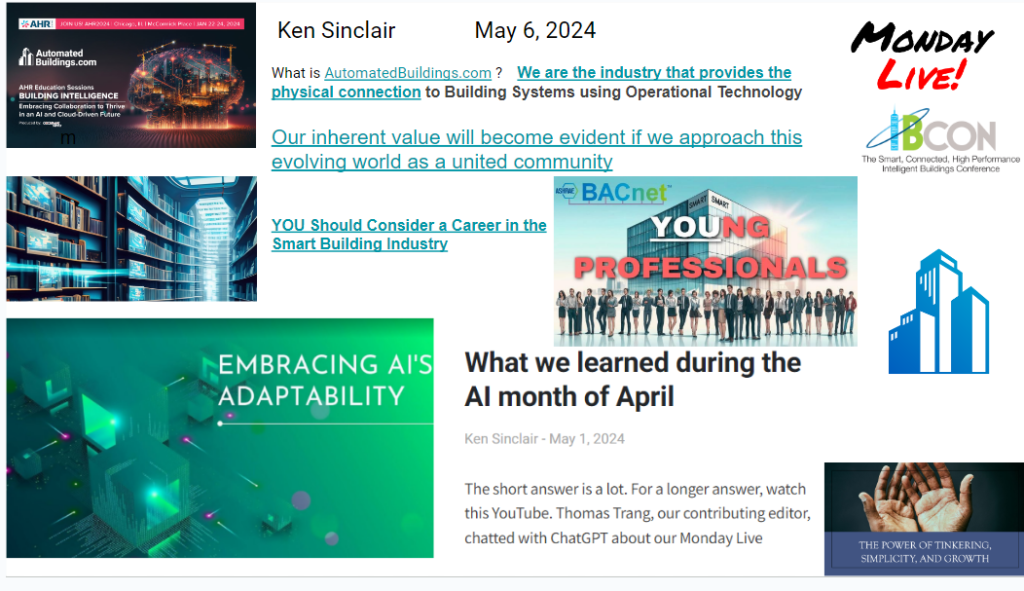Watch the lively conversation on Monday Live about the industry’s achievements over four years! We also discussed what remains as barriers to the broad adoption of smarter building technology.
Video clip More and more data from the silos

Thomas Trang, our contributing editor, generated this with AI about our Monday Live session.
- Integrating AI into Facility Management: Enhancing Daily Operations
Integrating Artificial Intelligence (AI) into facility management represents a significant advancement towards smarter buildings and operations. During a recent online discussion on the platform Monday Live!, experts explored various aspects of AI’s role in transforming facility management. This article synthesizes key insights from that discussion, focusing on how AI can be leveraged to improve day-to-day operations in this field.
The Promise of AI in Facility Management
AI is recognized for its potential to automate and enhance various aspects of building operations, from energy management to predictive maintenance. In the session, Ken Sinclair of Automated Buildings highlighted the fragmented nature of the industry and how AI can serve as a unifying force. By demystifying the operations and embedding AI into the operational technology (OT), facilities can not only streamline processes but also optimize the performance and sustainability of building systems.
Tinkering with AI
One of the central themes discussed was the concept of “tinkering” with AI technologies. This involves experimenting with AI to solve specific problems and improve system functionalities. The practical application of AI in facility management involves collecting and analyzing large volumes of data from various building systems, which can then be used to optimize operations and reduce energy consumption.
Case Studies and Examples
The session also highlighted specific examples where AI has already made an impact. One notable instance is the integration of AI with Dynamic Data Control (DDC) systems, which has allowed for more granular control and monitoring of building environments. This integration has led to improved energy efficiency and operational reliability.
The Role of Community and Collaboration
Sinclair also emphasized the importance of community and collaborative efforts in adopting AI technologies. The facility management industry is encouraged to adopt AI collectively, which would increase the inherent value of buildings as interconnected, intelligent systems. This collaborative approach can help in standardizing AI applications in facility management, ensuring that the benefits of AI are fully realized industry-wide.
Challenges and Considerations
While the prospects of AI in facility management are promising, the discussion also addressed several challenges. These include the need for a skilled workforce capable of managing and maintaining AI-driven systems and the integration of these technologies with existing infrastructures. Additionally, regulatory and standardization issues were discussed as potential hurdles in the widespread adoption of AI in facility management.
Conclusion
The adaptation of AI in facility management is not just a technological upgrade but a strategic move towards more responsive, efficient, and sustainable building operations. As facility management continues to evolve with AI, the focus will likely shift towards more integrated systems that not only automate tasks but also provide actionable insights that can transform the entire industry. The ongoing discussions and experiments, like those shared on Monday Live!, play a crucial role in shaping the future of smart buildings and intelligent facility management.
Monday Live! May 6, 2024
By Gemini
This discourse concerns a conversation about the application of Artificial Intelligence (AI) in improving quotidian operations within the discipline of Facility Management.
The core ideas presented are as follows:
- AI technology can be utilized to summarize and translate data from diverse facility management systems. This has the potential to enhance operational efficiency and facilitate the identification of trends and patterns by facility managers.
- AI can be leveraged to automate tasks such as scheduling maintenance and Troubleshooting operational issues. This can free up facility managers to focus on high-level, strategic endeavors.
- AI technology can be harnessed to enhance the occupant experience in buildings. For instance, AI can be employed to customize temperature and lighting settings specifically tailored to the preferences of the occupants.
The discourse also addresses the challenges associated with the implementation of AI in Facility management. These challenges encompass the necessity for data standardization and the requirement for a skilled workforce capable of maintaining and operating AI systems.
The prevailing consensus among the speakers is that AI technology possesses the transformative potential to revolutionize the field of Facility Management.
Smart Buildings AI Evolution (by ChatGPT Summarizer)
https://chat.openai.com/share/1ba57259-05ae-4aa5-8db0-03594a8e4346
Below is a summary of the May 06th MondayLive created with Microsoft Copilot and the YouTube transcript. This was still a very manual process, slower than that of Gemini.
It’s all about data as we move forward
Data management is crucial in today’s interconnected world, where the ability to access, analyse, and share data can significantly impact various industries.
- Silos in data management refers to isolated data ecosystems within an organization, where information is segmented and restricted to specific departments or sectors.
- These silos can create barriers to efficiency and innovation, as they prevent the seamless flow of information across different parts of an organization.
- Breaking down these silos involves fostering collaboration between departments, standardizing protocols, and implementing systems that facilitate data sharing and communication.
- By integrating data from various silos, organizations can gain a more comprehensive view of operations, leading to better decision-making and enhanced overall performance.
- The concept of a ‘data fabric’ has emerged as a solution to connect disparate data sources and enable a unified approach to data management across an organization.
- Effective data management strategies are essential for overcoming the challenges posed by data silos and for leveraging data as a valuable enterprise-wide asset.
- Business value creation through technology is a strategic process that aligns tech investments with business goals
- Innovation in business solutions can drive significant changes in organizational operations and create competitive advantages.
- Enterprise technology has not been fully leveraged in the building management sector, presenting an opportunity for transformative growth.
- AI has the potential to act as a catalyst in integrating disparate systems and breaking down silos within organizations, enhancing efficiency and communication.
- The integration of AI can simplify the management of diverse business functions and lead to more cohesive enterprise operations.
Summary of last Monday in this posts.




